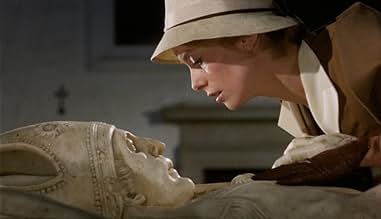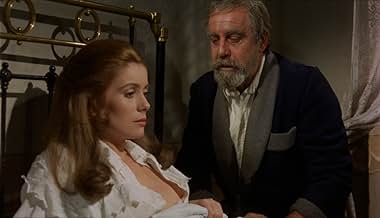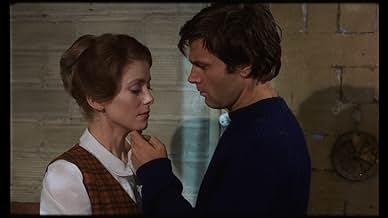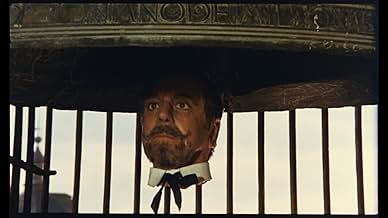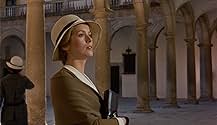Poco dopo la morte della madre, una donna giovane e innocente troverà rifugio nella famiglia del suo tutore aristocratico di mezza età, che la sottometterà alle sue molestie sessuali.Poco dopo la morte della madre, una donna giovane e innocente troverà rifugio nella famiglia del suo tutore aristocratico di mezza età, che la sottometterà alle sue molestie sessuali.Poco dopo la morte della madre, una donna giovane e innocente troverà rifugio nella famiglia del suo tutore aristocratico di mezza età, che la sottometterà alle sue molestie sessuali.
- Regia
- Sceneggiatura
- Star
- Candidato a 1 Oscar
- 11 vittorie e 4 candidature totali
- Muchacha
- (as María Paz Pondal)
- Don Cándido
- (as Juan José Menéndez)
One thing that's extraordinary about how Bunuel directs and allows for his actors to play the scenes is that the emotions are only heightened to a certain level, and never with the aid of things like music or tears. It is what it is: Don Lope has taken care of Tristana as her guardian since her mother died, and now has inserted himself as her father/husband figure, with his servant Saturna (stern-faced but understanding Lola Gaos) a kind of unofficial confessional. Tristana wants some freedom, just to go out and walk around, and feels caught by Don Lope even when not doing anything... until she meets Franco Nero's Don Horacio, a painter who could promise a new life. This goes without saying that one should take it for granted that Tristana isn't *that* young and could take care of herself without Lope, but maybe this is part of the point of the slight absurdity- and eventual tragedy- of this struggle.
Two years go by after she leaves Lope for Horacio, with a tumor in her leg. She's now a cripple, and now once again a kind of mental prisoner in Lope's home; the complexity of old man Lope as being duplicitous is seen right after he finds out she's sick and Horacio asks for Lope to help keep her home, and he nearly skips home saying "she'll never leave again!" All of this, leading up to a final twist that is very satisfying if extending the tragic dimension of Lope and Tristana, would be soapy and tawdry and, possibly, very standard in other hands. For Bunuel, there's a lot of personal ground here; I wonder at times if Rey is a little like one of those actors a director of Bunuel's auteur-stature uses as a means of expressing himself through an actor, or if it's just because he's so good at playing wicked AND sympathetic bourgeois. And the mixture of ideas, if not really themes, covering what's love and over-control, religion, deformity, a free will are potent and exciting even in such subtle and (as Maltin said) serenely filmed territory.
It's also a minor triumph for Deneuve, who between this and Belle de jour did some of her best work as an actress for the notorious surrealist. Her character's continual dream of Lope's beheaded top dangling from a church tower is the closest we see to a classic surrealist scene, though it's reminiscent of Los Olvidados as brilliantly expressing one character's mind-set. Deneuve is up for the challenge of putting up a tough interior and exterior presence; she gets paler towards the end (if this was for real or just a bad print I couldn't tell), and there's a lot of pain in her eyes and expression throughout. It's great work for one of the director's most subtly demanding works- beneath its conventional framework of a love-triangle story is sorrow and horror at the human condition.
- Quinoa1984
- 2 ago 2008
- Permalink
Trama
Lo sapevi?
- QuizLuis Buñuel said that many of Tristana's idiosyncrasies, including her habit of asking people to choose between nearly identical objects, was based on the director's sister's similar habits.
- Citazioni
Don Lope: Poor workers. Cheated and then beaten. Work is a curse, Saturno. Down with work that you have to do to survive. That work isn't honorable, as some say. All it does is fatten the exploiting swine. However, what you do for pleasure ennobles man. If only we could all work like that. Look at me, I'd rather be hanged than work! So, I live poorly, but I live without working.
- Versioni alternativeOriginally released in Europe at 105 minutes.
- Colonne sonoreÉtude No 12 in C minor, Op 10 'Revolutionary'
Written by Frédéric Chopin
I più visti
- How long is Tristana?Powered by Alexa
Dettagli
- Data di uscita
- Paesi di origine
- Sito ufficiale
- Lingua
- Celebre anche come
- Tristana
- Luoghi delle riprese
- Paseo Recaredo, Toledo, Castilla-La Mancha, Spagna(opening and closing scenes with Saturna, Viridiana and the mute boy)
- Aziende produttrici
- Vedi altri crediti dell’azienda su IMDbPro
Botteghino
- Lordo Stati Uniti e Canada
- 14.586 USD
- Fine settimana di apertura Stati Uniti e Canada
- 4754 USD
- 14 ott 2012
- Lordo in tutto il mondo
- 14.586 USD
- Tempo di esecuzione1 ora 39 minuti
- Mix di suoni
- Proporzioni
- 1.66 : 1
Contribuisci a questa pagina















